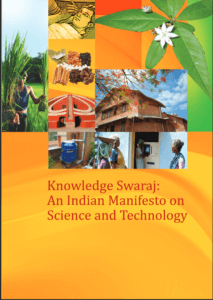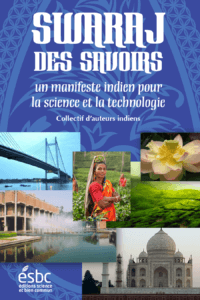Swaraj in Science: Towards a transnational STS encounter with Gandhi
Joseph Satish Vedanayagam
March 20, 2019 | Report-Backs
“What kinds of laboratory research shall we have to go in for? We shall need a number of scientists and chemists prepared to lay not only their expert knowledge at our disposal, but to sit down in our laboratories and to devote hours of time, free of charge, to experiments in the direction I have indicated. We shall have not only to publish the results from time to time, but we shall have to inspect and certify various products.” – Gandhi (1934)
A casual mention of the name “Gandhi” usually evokes ideas of peace, non-violence and of course, India. Seldom is Gandhi’s name associated with science, technology and society studies (STS), except by the rare scholar.

In an earlier Backchannels post, I briefly discussed an Indian experiment to formulate a manifesto for science and technology rooted in the needs and realities of the Indian people. This initiative drew inspiration from Mahatma Gandhi’s Hind Swaraj (Indian Home Rule) written in 1909, where Gandhi explained his views on Indian self-rule without alienating the rest of the world. The new manifesto on Indian science and technology – called “Knowledge Swaraj” – was published in 2009. Its publication was a collaborative effort of scientists, activists and social scientists belonging to a collective called the Knowledge In Civil Society (KICS) Forum. Briefly, Knowledge Swaraj explored what self-rule means in the context of a nation’s knowledges and technologies today, and what kind of principles and social institutions could govern such a self-rule. The fourth edition of the Handbook of Science and Technology Studies acknowledges that the Knowledge Swaraj manifesto represents an important postcolonial effort to formulate science and technology policy which serves the needs and priorities of the Indian people, “rather than following the trends set by Western technoscience” (p. 676). While the focus of Knowledge Swaraj is to rewrite the social contract between “Indian” science and society, the manifesto is also presented as “a modest offering from India to the world”. Significantly, the transnational reach of this manifesto from the global South was felt in one of the most industrialized nations of the Northern hemisphere – Canada.

Founded in July 2011 in Quebec, Canada, L’Association Science et Bien Commun (ASBC, Association of Science for the Common Good) is a collective of students and researchers who aim to stimulate awareness and action for public science in the service of the common good. Following an academic interaction between members of the KICS Forum and ASBC in a panel at the 40th World Congress of the International Institute of Sociology in New Delhi, members of the two collectives realized the similarities of their goals for a socially just science and technology. Subsequently, ASBC embarked on a French translation of the Knowledge Swaraj manifesto (Swaraj des savoirs: un manifeste indien pour la science et la technologie) which was released in 2017. Members of the ASBC collective also went one step ahead and took the manifesto to other parts of the world, including Haiti and French speaking Africa.
This year (2019) marks the tenth anniversary of the publication of the Knowledge Swaraj manifesto. While celebrating how an idea with Gandhian origins brought together STS researchers, students and activists from the global South and North, the occasion also offers an opportunity to view the Knowledge Swaraj effort as a continuing process. As a first step towards re-energizing the process of drafting a people oriented science and technology policy, a few of the original contributors to the Knowledge Swaraj manifesto met on December 21, 2018 in Hyderabad, India. Twelve other individuals participated in this occasion by submitting their views, aspirations, priorities and critiques vis-a-vis the manifesto. Submissions came not only from India, but also from Ivory Coast, Cameroon, Guinea, Canada and the Netherlands. Among other things, participants in the meeting reflected on how much of the principles outlined in Knowledge Swaraj continue to remain relevant for science in the global South today. More significantly, the participants discussed how the ideas in the manifesto could be re-energized to give a further boost to STS researchers in the contemporary setting of science and democracy in the global South.
One of the key ideas articulated by Gandhi and utilized to good effect in the Knowledge Swaraj manifesto is the concept of trusteeship. Drawing from Gandhi’s idea of trusteeship, scientists and innovators are seen as trustees, who will create, disseminate and use scientific knowledge for the sake of the nation and not for their personal benefit. Based on this idea of trusteeship as a new social contract between science and society, ASBC and KICS Forum have launched a call inviting participants to contribute a note – in any language – expressing their reactions, ideas, questions and comparisons aroused on reading the Knowledge Swaraj manifesto. Following the engaging responses to the French version of the manifesto, efforts are currently underway to launch Spanish and Portuguese translations as well.
We invite you to join this plurilingual and transnational debate on the proposals put forward by Knowledge Swaraj, and participate in this initiative to re-imagine the social contract between science and society. All the contributions will be compiled and published together in open access (under a Creative Commons 4.0 license), either as a book or on a website. Please visit the call for responses here.
Joseph is a doctoral researcher at the Centre for Knowledge, Culture and Innovation Studies (CKCIS), University of Hyderabad, India. He is exploring the relation between the missionary spirituality and scientific practice of Jesuit priests in independent India. This post was written by Joseph with inputs from Florence Piron (President, L’Association Science et Bien Commun) and MV Sastri (Founding Trustee, Knowledge in Civil Society Forum)
Published: 03/20/2019
